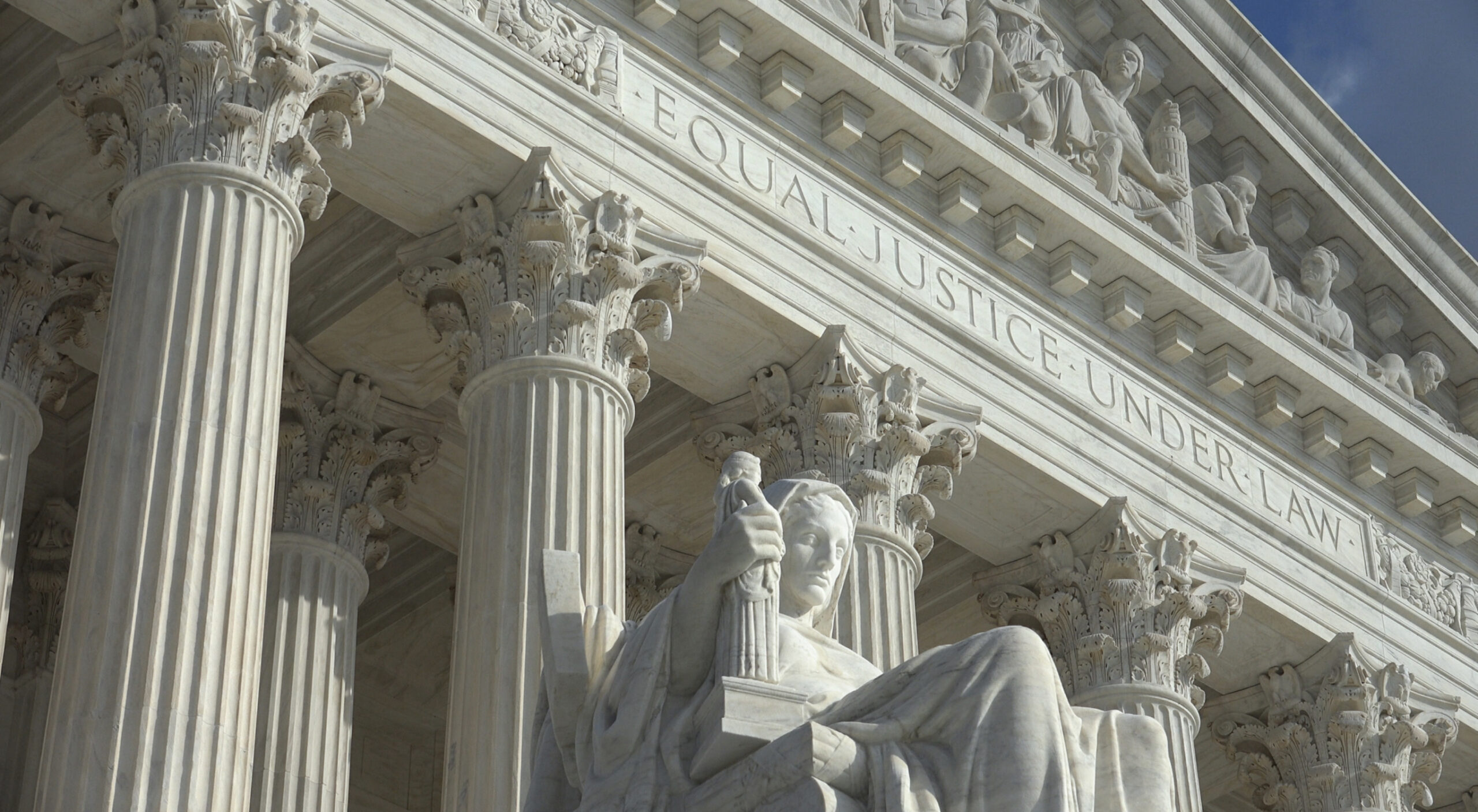In a 6-3 decision that included three of its most reliably conservative members, including both of the justices appointed by President Donald Trump, and three of its most liberal members, the United States Supreme Court ruled Monday that the Constitution requires states to secure a unanimous jury verdict in order to convict any defendant accused of a serious crime.
The majority opinion in Ramos v. Louisiana, authored by Justice Neil Gorsuch, represents a historic victory for civil justice advocates and a humiliating defeat for Louisiana state Attorney General Jeff Landry, who spent an untold fortune, estimated by one former lawmaker to be in the millions, to defend a Jim Crow-era law that was abolished in 2019 through a statewide referendum. Landry’s decision to pursue the case was entirely his own and was made without the support of Gov. John Bel Edwards and despite opposition from the American Bar Association, the ACLU, the NAACP, the Rutherford Institute, and the Innocence Project, among others.
The Court’s decision received the praise of a wide-ranging assortment of liberal and conservative lawmakers and advocacy organizations, including the left-leaning Southern Poverty Law Center as well as the Pelican Institute, a libertarian “think tank” affiliated with the Koch brothers.
Because the decision was about whether, constitutionally, a person can be convicted of a serious crime even if the state fails to convince all twelve members of the jury of their guilt, the factual background of this specific case is largely irrelevant in how the Court reached its opinion and played almost no part in informing the arguments made by both the plaintiff’s and the defense’s legal counsel.
That said, there is at least one remarkable aspect that deserves attention: At one point, the man whose name is now forever enshrined in legal history, Evangelisto Ramos, found himself in prison, sentenced to serve the rest of his life behind bars for a brutal crime he adamantly claims he did not commit, fluent only in a language that was not spoken by anyone in a position of authority, unable to afford a lawyer, and yet somehow still determined enough to write his own legal appeals.
In all but one other state, Ramos would have been allowed to walk out of the courtroom a free man after two members of his jury refused to find that he was guilty of ending Trenice Fedison’s life, and there’s a legitimate argument that, had Ramos been able to afford the kind of defense he needed, his trial would have lasted a lot longer than the two days that he was given.
Whether he is a hero or a villain is something that will be determined later, because the Supreme Court decided that Evangelisto Ramos is entitled to a new trial.
Instead, in an effort to win today’s case, Louisiana embraces the idea that everything is up for grabs. It contends that this Court has never definitively ruled on the propriety of nonunanimous juries under the Sixth Amendment—and that we should use this case to hold for the first time that nonunanimous juries are permissible in state and federal courts alike.” – Justice Neil Gorsuch, Ramos v. Louisiana

Ultimately, Landry, a former one-term congressman whose brand of conservative politics is extreme and often outlandish, even for Louisiana, mustered only one amicus -or “friend of the Court”- brief, a rambling exposition on Anglo-American legal history that the Court almost completely rejected, filed by Utah’s attorney general and endorsed by a dozen other state attorneys general, all of whom, like Landry, are Republicans, as well as Isias Sanchez-Baez, the Solicitor General of Puerto Rico. (Puerto Rico has its own complicated history of allowing non-unanimous jury verdicts).
Landry is the immediate past president of the National Association of Attorneys General, and the fact that he was only able to corral a dozen or so of his conservative colleagues is telling. So too is the fact that the only public official in Louisiana who formally lent his name in support of Landry’s position was embattled Orleans Parish District Attorney Leon Cannizzaro.
New Orleans City Councilman Jason Williams, who hopes to oust Cannizzaro from office this fall, praised the Court’s decision and specifically commended state Sen. J.P. Morrell, the Unanimous Jury Coalition, and the Promise of Justice Initiative for leading the successful statewide referendum that resulted in the law’s abolishment. “The result of today’s decision by the U.S. Supreme Court is truly momentous, as it creates a more equitable opportunity to achieve justice in a historically slanted system,” said Williams. “Even very conservative judges weighed in strongly, noting ‘evidence that the racism that spawned the split verdict law 120 years ago in Louisiana remains embedded within it today.’ The decision is also a reminder that we should not blindly rely on old, broken policies and systems to achieve the goal of real public safety.“
Perhaps ironically, Calcasieu Parish D.A. John DeRosier, who had supported the state’s non-unanimous jury law when it was debated in the legislature, is also mentioned in a brief, but it wasn’t one filed to bolster Landry’s case. It was to ensure the Court knew that DeRosier defended the law, even while openly acknowledging its racist intentions.
Separately, Oregon’s attorney general, Democrat Ellen Rosenblum, filed an amicus brief that cautioned the Court against issuing a ruling that could overwhelm her state’s justice system. After Louisiana voters abolished its non-unanimous jury law in 2019, Oregon had been the only state in the nation in which the practice was still allowed. The Court’s decision on Monday effectively stuck down Oregon’s law, which, like Louisiana’s, was a vestige of Jim Crow.
Rosenblum largely ignored the convoluted historical arguments that were at the center of Landry’s defense, a fact that was not lost on any of the Court’s nine members. Indeed, her arguments were taken far more seriously and persuasively than those made by Jeff Landry and his deputy Liz Murrill. (Shortly after his first election, Landry declared Murrill as the state’s first-ever “Solicitor General,” an office that has never been statutorily authorized and a title that has never been recognized as a matter of custom).
Murrill’s presentation of the case during oral arguments was so exasperated and tortured that, at one point, it generated laughter loud enough to merit mention in the transcript. Murrill claimed, among other things, that if the Court were to allow Ramos with the opportunity to have a new trial, then it would effectively jeopardize the convictions of more than 32,000 people. No one took her wild estimate seriously, and when pressed, she was forced to admit that it was pure conjecture.
“Have you any idea?“ Justice Breyer asked her. ”Is there — with all the work gone into this, has anybody got any rough idea of what percentage of those people who are convicted are convicted by non-unanimous juries?”
”There’s just no reliable data,” answered Murrill, an assertion that Breyer politely suggested he believed to be absurd.

The real number, it turns out, was 36; today, it’s 44.
It is also worth noting that while Oregon, which had already been expected to strike down its non-unanimous jury law at the time the Court decided to hear the Ramos case, it was also concerned with the possibility of retroactively invalidating convictions. But unlike Louisiana, it wasn’t arguing that its statute was sensible or good, and it never denied its racist provenance.
Rather, it cautioned against an overly broad opinion that failed to consider the ways in which its courts had relied on the fact that the law had never before been disturbed. The majority opinion accounts for those concerns, and while the approach it outlines will almost certainly be tested and was criticized by the dissent, the Court’s decision only voids convictions against defendants who have not yet exhausted the appeal’s process.
The unusual alignment and the interaction between the majority, concurring, and dissenting opinions on the issue of stare decisis ensures that Ramos v. Louisiana will become required reading for the nation’s next generation of lawyers and has already generated dozens of articles from legal scholars and Supreme Court watchers.
The six justices who compromised the Court’s majority represent both sides of the ideological spectrum, but the three justices who dissented- Kagan, Roberts, and Alito- are also notable for their ideological differences. But what is less likely to receive attention, at least nationally, is the fact that the nearly all of the arguments made by Jeff Landry were rejected by all nine of the Court’s members.
The case wasn’t about whether or not Louisiana’s law was sensible. In fact, Gorsuch, Kavanaugh, and Thomas all found that not only was the law unconstitutional, it was definitively, undeniably rooted in racism.
Only Justice Alito bought Landry’s specious argument that the state had somehow washed away its racist intentions merely because it hadn’t been abolished in 1973 during the state’s Constitutional Convention. Alito, presumably, skipped over The Advocate’s brilliant and thorough reporting that revealed the Jim Crow-era law continued to disproportionally affect black defendants. As a result of its reporting, the paper won its first-ever Pulitzer Prize. (Incidentally, the paper is all but certain to be considered for another Pulitzer for its reporting on Landry’s dubious business dealings).
At its core, the case was about whether a concurring opinion written in 1972 by Justice Lewis Powell- and that failed to earn the support of any other member of the Court- should be considered valid legal precedent. The Court’s answer, put simply, was “of course not.”
Landry and Murrill attempted to convince the Court that the Framers of the Constitution had never intended to require unanimity in jury verdicts because the word “unanimous” appeared in an earlier draft of the Sixth Amendment but was edited out of the final version. Presumably, theIr approach was strategically designed to win over the affections of Justice Thomas, who considers himself to be an “Originalist” (that is, he claims his opinions are based on the original meaning of the words used in the Constitution) and the two acolytes of the late Justice Antonio Scalia- Gorsuch and Kavanaugh. Scalia referred to himself as both a Textualist and an Originalist, which he often used interchangeably.
Ultimately, none of the three men were persuaded at all by Landry’s argument. The word “unanimous” wasn’t t removed because the Framers rejected the concept of unanimity, but because it had been self-evident that verdicts needed to be unanimous, a concept that had been well understood in the common law for at least two centuries. “Unanimous” was edited out because it was redundant.
There is another significant difference between the position taken by Oregon’s attorney general and the one taken by Louisiana’s. After the Court announced its ruling on Monday, Rosenblum enthusiastically praised the decision. “This is good news!” she exclaimed (exclamation point included).“It is an embarrassment to our otherwise progressive state that we are the only state in the country with a law in our constitution that allows criminal convictions without juror unanimity.” Jeff Landry, on the other hand, declined comment.

